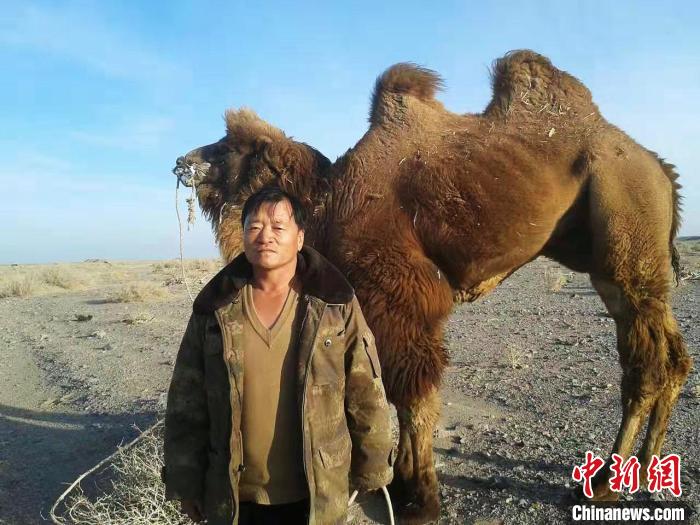
The picture shows Girigala. (Infographic) Photo courtesy of the interviewee
The picture shows Girigala. (Infographic) Photo courtesy of the interviewee
Alxa, China News Network, June 2 Title: 30 Years of Jiri Gala in the Forbidden Zone of Life: Guarding the Soil and Fixing the Border Without Forgetting the Rich People
China News Network reporter Zhang Linhu
"Only when there is national unity and social stability can the economy and society develop harmoniously, and the people's lives will become richer and richer, and their sense of happiness will become higher and higher." Ji Rigala, the former party branch secretary of the Inner Mongolia Autonomous Region's Alxa League's Ejina Banner Hariburig deyin Ula Town, Ulan Ula Gacha (Gacha is equivalent to a village), knows his way well.
Located in the westernmost part of Inner Mongolia, bordering Mongolia to the north, Ejin Naqi covers an area of 114,600 square kilometers and has only about 30,000 people.
The picture shows Gizhgalla on the patrol. (Infographic) Photo courtesy of the interviewee
In 1992, after retiring from the army, Jizhigara set foot on this land for the first time, and the scene in front of him was unforgettable: "The climatic conditions are harsh, the infrastructure conditions are backward, and the border line is long..." Jizhigara concluded.
The town of Hazhibrigdeyin Ula, located in the northwest of Ejin Banner, was home to 236 people on a vast land of 18,000 square kilometers as of the end of 2019, and the Gobi Desert could not be seen at a glance. It has been called "a forbidden area where human beings cannot survive" by UNESCO.
Ulan Ulagacha, as the largest administrative village on the mainland, is mostly the Gobi Desert, sparsely populated, inaccessible, and large no-man's land.
With the belief of "guarding the northern gate of the motherland", this man chose to take root in this Gobi Desert.
"30 kilometers as neighbors, 100 kilometers to visit the door, is a true portrayal of life here." In 2002, Jizhigara was elected secretary of the party branch of Ulan Ulagacha, and since then he has embarked on a life model of taking the lead in demonstration, leading herdsmen's houses to guard the border and serving the border defense.
The picture shows Gizhgalla and his "comrades-in-arms" patrolling the border. Courtesy of respondents
In the past, the information on the border line was blocked, and Jizhigala worked hard to introduce the country's policies and ideas to every household, from the initial camel ride, to motorcycle ride, to driving into the house, even he himself did not know how much he had run so many years.
"Only by developing the economy and retaining the industry can we drive farmers and herdsmen to become rich and can we continue to steadily increase the income of farmers and herdsmen." JiriGala takes the lead in developing traditional animal husbandry, relying on the geographical advantages of sophora forest resources, adopting the "branch + base" model, developing the sand industry, carrying out cistanche planting, leading herders to build a Gacha collective cistanche planting base, and developing and expanding the collective economy.
At the same time, Jizhigara also formed a pair of help and support with party members and herdsmen in difficulty, publicized practical science and technology in agricultural and pastoral areas, provided suggestions and information for their prosperity and income increase, and tried to help herders increase their income. In 2021, the per capita income of Gacha herders will reach 29,000 yuan, which is much higher than the per capita disposable income of farmers and herdsmen in the whole league.
For 30 years, holding on to northern Xinjiang, Jizhi gala is not only the people's service soldier, but also the support officer of the army. He changed from a "foreigner" to a "local Bai Xiaosheng".
The picture shows Jizhigara distributing materials to farmers and herdsmen. (Infographic) Photo courtesy of the interviewee
As a military police liaison, Gizhgalla has been responsible for the breeding of military camels for many years. "It is better to let our camels suffer from disasters and hardships, but also to ensure the quality of life of military camels, always maintain a good state of combat readiness of military camels, and do a good job in logistical support for military and police units." Girigala said.
In Girigala's view, it was his duty to guard the border and solidify the land. "I want to protect every inch of the motherland." Only the stability of the frontier of the motherland can we have our happy little home. ”
In 2018, Jizhigala was commended as an "excellent border citizen" by a unit of the Chinese People's Liberation Army.
The harmonious and stable environment of Ulan Ulagacha is inseparable from the cooperation of the military and the people and the police and the people; here is the national model border defense company - Qinghekou Company, and there is the national outstanding grass-roots party organization - Suanjingzi Border Defense Police Station.
Today, the 56-year-old Girigala is still here.
Under his influence, his son Tara also chose to return to his hometown after graduating from university, and gradually grew into The Successor of Gizhgalla.
"Although we are getting older, we will never abandon the cause of guarding the soil and fixing the border, and we have been teaching the people around us to guard the soil and the solid edge together." Jizhi gala said that in order to protect the grass and trees on the border, he and 34 local herders will be permanently stationed in the depths of the Gobi, accompanied by wind and sand, and grow like Ejina poplar, which will not dry up for a thousand years. (End)